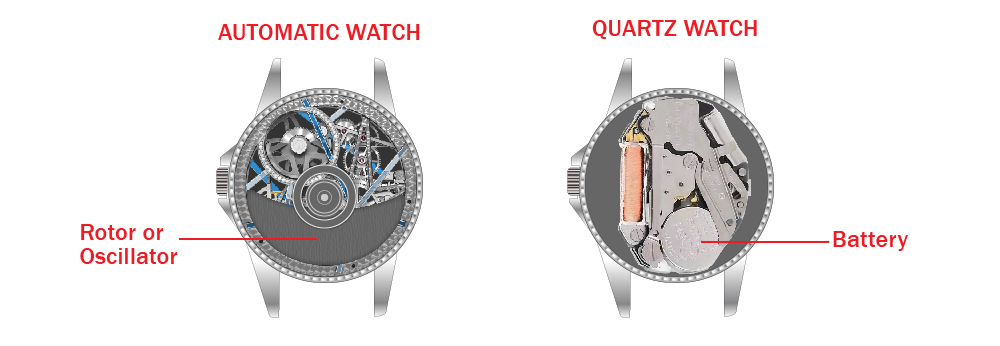Quartz and mechanical watches differ primarily in their mechanisms for keeping time. Here’s a detailed comparison:
Mechanism

Mechanical Watch:
- Power Source:Powered by a mainspring that needs to be wound manually or via an automatic winding mechanism (in automatic watches).
- Timekeeping:Uses a series of gears and an escapement mechanism to regulate the release of energy from the mainspring, driving the hands of the watch.
- Movement:The movement of the second hand is smooth and continuous, often appearing to “sweep” around the dial.
Quartz Watch:
- Power Source:Powered by a battery.
- Timekeeping:Uses a quartz crystal oscillator that vibrates at a precise frequency when an electric current passes through it. This frequency is used to regulate the movement of the hands or digital display.
- Movement:The movement of the second hand typically “ticks” in one-second intervals, giving it a more distinct and jerky appearance.
Accuracy
Mechanical Watch:
- Accuracy:Generally less accurate than quartz watches due to environmental factors and the intricacies of the mechanical movement. They might lose or gain several seconds per day.
Quartz Watch:
- Accuracy:Highly accurate, often losing or gaining only a few seconds per month. This is due to the precise frequency of the quartz crystal.
Maintenance
Mechanical Watch:
- Maintenance:Requires regular maintenance and servicing every few years to ensure proper functioning and longevity.
- Durability:More susceptible to damage from shock, magnetism, and environmental factors like moisture and dust.
Quartz Watch:
- Maintenance:Requires battery replacement every few years. Otherwise, minimal maintenance is needed.
- Durability:Generally more robust and less sensitive to external factors compared to mechanical watches.
Cost
Mechanical Watch:
- Cost:Typically more expensive due to the intricate craftsmanship and labor involved in creating the mechanical movement.
Quartz Watch:
- Cost:Usually less expensive to produce, making them more affordable.
Aesthetics and Prestige
Mechanical Watch:
- Aesthetics:Often appreciated for their craftsmanship, complexity, and the beauty of the mechanical movement. Some models feature transparent case backs to showcase the intricate workings.
- Prestige:Considered more prestigious and collectible due to the tradition and skill involved in their manufacture.
Quartz Watch:
- Aesthetics:Can be just as aesthetically pleasing, but they lack the visible mechanical intricacies of mechanical watches.
- Prestige:Generally considered less prestigious in the horological community, but highly valued for their practicality and reliability.
Summary
- Mechanical Watch:Traditional, intricate, and prestigious with smooth hand movement, but requires regular maintenance and is less accurate.
Quartz Watch: Modern, highly accurate, and low-maintenance with ticking hand movement, but generally less prestigious and lacking the intricate craftsmanship of mechanical watches.
